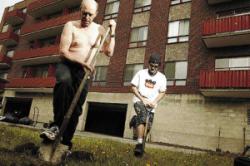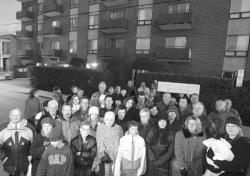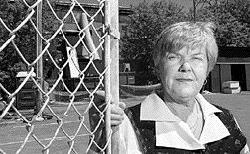June 4, 2005
 |
| CREDIT: Julie Oliver, The Ottawa Citizen |
| Volunteers Gerald Chamberlain, left, and Marc Nedzela ready a garden at 208 St. Andrew St., which was bought to house 36 mentally ill people. |
| Juliet O'Neill | |
| The Ottawa Citizen |
 |
| CREDIT: Julie Oliver, The Ottawa Citizen |
| Volunteers Gerald Chamberlain, left, and Marc Nedzela ready a garden at 208 St. Andrew St., which was bought to house 36 mentally ill people. |
She goes by "Angel," a nickname that also fits the people who have helped her to get where she is now: ready to live independently in her own apartment.
Angel doesn't remember arriving at Hope Living, where she has lived for the past five years. It's a Shepherds of Good Hope facility for 35 men and women diagnosed with severe mental illness.
A victim of a violent and terrifying assault, she was rescued by the Salvation Army and delivered to the care of Shepherds, a charity that provides food, shelter and friendship to thousands of people each year.
Angel doesn't belong at Hope Living anymore. Shepherds' housing manager Heather Henstridge says the facility is designed for people who are not able to function alone, who need help managing their medication, and relearning lost life skills.
For the last year, Angel has been able to handle her own medication for bipolar depression. While the facility is modern, her spacious room cheerful, she doesn't like the street scene outside, on Murray and King Edward streets, where she has seen drug dealers. "They didn't used to be around here," she said.
And she is out of place among some of her fellow residents: a man who speaks incoherently in an array of languages; an older woman with schizophrenia who often panhandles for cigarettes in the Byward Market; and a newcomer who had to be coaxed into cleaning himself for the first time in years.
"If they weren't here, they'd be on the street," said Grace Soucie, a Shepherds' volunteer for the 24-hour supervision at the facility. Coaxing the newcomer into having a bath "was a breakthrough for us." He won't take a shower because his illness makes him terrified of going under water.
The next breakthrough was when he started sharing food in the communal kitchen. When he arrived, he hoarded his food in his room.
"I'm anxious to move," Angel said. "I'm also very scared because I've been through quite a bit of violence in the past." However, she is also comforted that when she moves, she will still have the help of two community support workers -- a case manager and a psychiatric nurse -- who have helped her recovery. After she adjusts to living independently, she'll focus on what to do next, perhaps finding work. "First things first," she said.
Angel is going to be one of the first tenants of 208 St. Andrew St., a four-storey apartment block the Shepherds bought in December with $3.1 million from Ontario's Health Ministry.
The funds are meant to house 36 people with severe and persistent mental illness, such as schizophrenia or bipolar disorder, who would otherwise likely be homeless. Many of them will also be recovering from the alcohol or drug addiction that frequently develops when a mentally ill person is attempting to treat undiagnosed illness on their own.
The Shepherds' plan was to move people like Angel, highly functioning ill people who need periodic support but no supervision, into the building one by one over the next few years, as apartments became available by attrition. That plan has changed, as a result of a community uproar.
 |
| CREDIT: Julie Oliver, The Ottawa Citizen |
| Rob Eady, right, talks to Frederic Adams. Of nervous neighbours, Mr. Eady says: 'They're afraid people will hide' in the cedars that decorate the front of the building 'and jump out at them.' |
Tenants who already lived in the building were assured at a community meeting that they would not be evicted. The promise was not necessary. Within weeks of signing the mortgage, there was an exodus from the building. Nearly all 70 tenants fled their new landlord and future neighbours, some of them in fear and anger.
By the end of April, the apartment block stood virtually empty. It was a failed case of NIMBY: not in my back yard. The tenants could not keep the Shepherds' tenants away, so they moved out instead.
Around the corner on Cumberland Street, another Shepherds building, a one-story rooming house, stood almost empty, too. Empty except for one man who had barricaded himself in his room, determined not to move from the place he calls home. In the pouring rain, a crisis intervention team went in and took him to hospital for a mental health assessment.
There were only four days to go before expiry of the Shepherds' rental lease on the rooming house, which Shepherds had been vacating during the previous year. This was part of the agency's plan to consolidate its housing and focus on 208 St. Andrew St.
After the exodus at St. Andrew, Shepherds staff realized most units needed sprucing up. When bathroom tiles in one unit were removed for replacement, the mouldy wall behind it collapsed. The halls, painted lurid colours, needed toning down. The place now is buzzing with renovation activity, refinishing scuffed parquet floors, fitting the bathrooms with fans and new fixtures.
Plans were also in place to cut down the cedar hedge out front of the apartment block to suit some nervous neighbours. "They're afraid people will hide here and jump out at them," said Shepherds' spokesman Rob Eady, astonished by the idea. "We're definitely keeping those two nice trees at the entry, though," said Beth Jefferson, the Shepherds' property manager.
Ms. Jefferson had worked hard to raise funds for the retrofit. She landed a $75,000 anonymous donation for fixtures, appliances and window blinds, talking suppliers into bargain prices. Ms. Jefferson says she cried a lot during this process, tears of frustration and tears of relief.
No wonder.
It had taken Shepherds more than four years to land the apartment block. They had planned to buy rooming
houses in Sandy Hill four years earlier, but community activists drummed them away, literally shouting them down at a community meeting. That NIMBY campaign was successful.
This time, in Lowertown, Shepherds used stealth. Community activists did not catch wind of the 208 St. Andrew St. plan until a closing date on the mortgage was already set. The experience in Sandy Hill showed that "if we ask the community for permission, we will not get permission," said lawyer John Peters, Shepherds' volunteer president.
Shepherds brazened out the protests in Lowertown. By now they were armed with advice from a handbook, Yes In My Back Yard, prepared by a Toronto-based coalition of supportive housing advocates. The No. 1 objection by opponents, advised the booklet, would be that "our neighbourhood already has its fair share." Sure enough, that's what critics in Lowertown argued.
 |
| CREDIT: Jean Levac, The Ottawa Citizen |
| Members of the St. Andrews Street neighbourhood were upset by Shepherds of Good Hope plans to buy the apartment block. Community activists did not catch wind of the plan until a closing date on the mortgage was already set. |
There are at least 16 organizations in Lowertown to help the down and out, such as shelters, soup kitchens, a detox facility, and a drug-addiction clinic. While some are almost invisible, the streets outside Shepherds' soup kitchen and the drop-in Centre 454 are a gathering place for people who might appear unsavoury and frightening to passersby. Panhandlers wander into the traffic despite repeated complaints and threats by Shepherds staff to refuse service to them.
But the coalition booklet dismisses the fair-share argument as a cover for prejudice against the mentally ill that would be unthinkable toward any other group. "To identify discriminatory statements, start by using the 'wince' test," advises the handbook. "If you substituted the word 'black' or 'Greek' or 'gay' for the word 'mentally ill,' would the statement make any fair-minded person wince?"
The protest lawn signs in Lowertown said "Integrate, Don't Concentrate." If it was only that simple.
- - -
The turmoil over 208 St. Andrew opens a window onto a usually invisible struggle by a handful of Ottawa agencies to secure housing with community supports for hundreds of mentally ill people. It is especially difficult when they are to be congregated in one building.
It's a stubborn legacy of de-institutionalization, a cornerstone of mental health policy in Canada since the 1960s and 1970s, when governments began shutting down thousands of psychiatric hospital beds. That happened as breakthroughs occurred in the development of medicine to eliminate or manage symptoms of psychotic illness, depression and anxiety.
The vast majority of people with mental illness were supposed to be cared for in the community instead of institutions. The trouble has been that "the resources didn't follow the people into the community," said Tim Aubry, director of the Centre for Research on Community Services at the University of Ottawa. There has been some headway in Ottawa in housing in recent years, he said, but the community supports have not kept pace with need.
A Canadian Mental Health Association estimate cited by Mr. Aubry says Ottawa currently has about 90 case managers providing intensive case management or Assertive Community Treatment (ACT) team services to about 1,150 people -- but the city needs about 70 more case managers to serve another 1,000 people.
The Ottawa chapter of the CMHA provides case management and hospital outreach services to about 700 of that total in the community each year. But, director Marion Wright says there are never enough resources to meet demand. "It's an under-resourced sector and it's been under-resourced for more than 10 years," she said.
The worst problem is the shortage of case managers. "Housing runs a close second," she said. In fact, the two are entwined: case managers are the people who help people find housing, stay on track with medical treatment, and cope with life outside hospital. And even when funds are forthcoming for buildings, neighbours often fear that these are little more than hospitals without staff; or, as in the case of Shepherds, a magnet for unpleasant street people.
 |
| CREDIT: Julie Oliver, The Ottawa Citizen |
| A University of Ottawa study found that many of the mentally ill living in the community are desperately isolated. 'They've got no links to anything meaningful or worthwhile. They're like phantoms out there,' says Tim Aubry, director of the Centre for Research on Community Services at the University of Ottawa. |
Anne Chornenky, executive director of Ottawa Salus Corporation, the non-profit agency that provides most of the housing for mentally ill people in Ottawa, said she was not surprised by the NIMBY campaign against Shepherds. How many times has this happened to Salus? "Every time," she said.
Salus has bought or built eight apartment buildings and four group homes since its inception 28 years ago. The 19-unit Salus house on Gladstone and Preston, which was gutted in a fire last month, was not opposed by nearby residents when it was proposed as a millennium project. But she said the Preston Street Business Association challenged the building through land-use regulations -- a classic NIMBY tactic -- contributing to a delay in construction. "That was even though we replaced two derelict buildings," Ms. Chornenky recalled. When Salus has bought buildings, the majority of tenants move out. "I think it speaks to fear of the unknown," she said.
Salus provides housing for about 200 people. "It's people's preferences that are driving what we develop," Ms. Chornenky said. "It's all over the map." Some people want apartments where neighbours do not know they are ill. Some prefer housing in small, designated apartments where empathy and peer support is close and they won't alarm anyone if they seem antisocial. Some need communal living, where they can learn lost social skills. "We try to have enough variety in our stock," she said. "Where the individual lives is going to be where their healing starts."
The Salus housing stock reflects the three policy trends in community housing that have taken place in the decades since de-institutionalization began.
First came communal group homes with in-house medical support, appropriate for people who had lived, sometimes for years, in an institution. Then, with the emergence of a generation of people who had not been institutionalized, there was a trend for housing that gave people private apartments or rooms in buildings that included full-time supervision and medical care.
Since 1995, Ontario policy has been aimed at separating medical and social supports from housing and attaching them to the individual, so that if the person moves, they don't lose the support. Support is given through case managers from Salus, the CMHA and other agencies; and through the provincial Health Ministry's ACT teams.
ACT teams of psychiatrists, nurses, social workers and occupational therapists are assigned to groups of people in the community 24 hours a day, seven days a week. There are five ACT teams in Ottawa, each with a maximum of 100 clients. Some clients are visited by someone from the team as often as once or twice a day.
Pam Jackson manages the ACT team based at the Royal Ottawa Hospital. She says the No. 1 need for most of her team's 75 clients, some of whom live in emergency shelters, is decent, affordable housing. All the ACT team can do when someone needs housing is get them on an agency's waiting list. The agencies "fight that battle for us."
 |
| CREDIT: Julie Oliver, The Ottawa Citizen |
| Anne Chornenky, executive director of Ottawa Salus Corporation, the non-profit agency that provides most of the housing for mentally ill people in Ottawa, said NIMBY campaigns like the one that opposed the Shepherds' plan happen 'every time' a similar project is announced. |
She cited a big need for housing that falls between boarding houses, which are supervised 24 hours a day and offer no independence and little privacy, and independent living, with which some clients cannot cope. About half of her ACT team's clients are constantly on the move, in and out of housing that is inappropriate for them.
It is frustrating to the team's mission.
"More appropriate housing would make it easy for us to help clients become stable in society, because you can imagine if someone's in a housing crisis, their mental health is not going to be too stable either," Ms. Jackson said. "It would help us in the treatment. We could move on to rehabilitation and treatment."
Mr. Aubry has been involved in a six-year, $3.5-million Ontario government-paid evaluation of the community support system. It found that after 18 months of help from a case manager or an ACT team, the average number of nights clients spent on the street dropped to two from 43.
The study also found that this kind of care cost as much as five times less than hospital: $68 a day compared with $481 in hospital, in 2001.
However, the study also found that many clients are isolated, living alone or with unrelated adults. And they spend most of their time sleeping or in such "passive leisure" pursuits as watching TV. Few had jobs to go to. And most were struggling on an average of about $1,000 a month.
"We had more than one participant -- when we were asking people about their social network: 'Who's important to you? Who do you have contact with? -- who identified the interviewer as in their social network," Mr. Aubry said. "The graduate students who conducted the interviews were just blown away by that. It made them realize just how isolated some people are, even though they're living in the community. They've got no links to anything meaningful or worthwhile. They're like phantoms out there."
Mr. Aubry and others conclude that policy-makers should be working on a new generation of programs that focus on helping this population return to school and participate in the labour market, to truly reintegrate into society.
"There is consensus in the mental health sector that de-institutionalization has been implemented before critical community services were developed in the areas of housing, support, education, and employment," Mr. Aubry told the Senate commission on national mental health care. "A major contributing factor to this lack of preparation was the very slow pace adopted by provincial governments in reallocating resources from institutions to community services."
Results were released in May of a two-year study of 147 Ottawans with severe mental illness, many of whom had acute housing difficulties (facing imminent loss of housing or having moved at least three times in the previous nine months). After two years of community support, the percentage of those with housing difficulties had dropped to 10.3 per cent from 53.7 per cent for those with intensive case management, and to 27.3 per cent from 61.2 per cent for those with less intensive care.
 |
| CREDIT: Bruno Schlumberger, The Ottawa Citizen |
| People with mental illness were supposed to be cared for in the community instead of institutions, says Tim Aubry, but the trouble is that 'the resources didn't follow the people into the community.' |
"It may be that housing stability serves as the foundation on which consumers begin to rebuild their lives," the study said.
Research also found the cost of community health care to an individual in Ottawa is about $35,000 per year. That includes social assistance or disability payments. About a third of the cost is medical and psychiatric services and almost no resources were spent on education, employment training or recreation and leisure.
- - -
Arnel Guillemette can testify to the need for job training programs. His organization, Horizons Renaissance Inc., recently put on hold, for lack of funds, a program that helped francophones learn skills for the workplace or self-employment, such as fast-food service or printing cards. The program cost between $80,000 and $100,000 annually.
Mr. Guillemette describes his organization, which also runs a group home, as "small but effective" and in need of more funds and case managers to cope with a waiting list that recently began to develop. "What we have now responds to the tip of the iceberg."
About half of the 600 people on Salus Corporation's waiting list urgently need housing, said Ms. Chornenky. They are people with no fixed address who are ready to leave hospital, living in shelters or with friends. The other half of the 600 are in inappropriate housing; they don't feel safe or they need a home with more support or less supervision.
The fact that there are as many as 10 waiting lists among different agencies, some of which overlap, indicates the difficult state of affairs, said Ms. Chornenky. There is no money for a master list. But agencies do try to co-ordinate resources.
Mental health caregivers are constantly "scrambling" for housing, said Dwane UnRuh, CMHA housing program director. The CMHA now provides housing in 92 apartment units. It pays rental subsidies to private landlords and has purchased condos.
Mr. UnRuh said CMHA has no waiting list but tries to respond to greatest need. "It's hard to prioritize because so many people are in such dire straits," he said. "Housing is really the beginning of recovery," he said. "Some studies show that if you offer a person housing first, with no catches -- and then we'll see what you're able to work on afterward -- that the success rate is very high."
The CMHA recently received $91,000 from the Ontario government for housing people diverted from the court system. "When you have a mental illness, your behaviour can often be taken as criminal, in a sense, in that you've done something that is disorderly in the community," he said. "There are a lot of people in the criminal justice system that shouldn't be there." The funds bring the agency's housing budget to $297,500 annually. Mr. UnRuh estimates that between 15 and 20 more people will get housing as a result.
|
|||
|
Housing help is embedded in every CMHA caseworker's job. He said it takes longer now to find housing, because rents soared while social assistance was frozen and community startup funds for furniture dwindled. Five or six years ago, a CMHA caseworker in Ottawa could count on helping half of their 60 to 70 clients a year find housing. Now only a quarter of clients can be helped.
Ms. Chornenky attributes some aversion to living beside mentally ill people as an unjustified fear of violence stoked by media crime reports. "That's what sticks in our mind," even though studies show the mentally ill population is no more violent than the general population, she said. In fact, "most of our tenants are fairly timid."
Mentally ill people are often more vulnerable outside their homes than most people, she said. Some of them lack social skills and are preyed upon by drug dealers and prostitutes for their money or their prescription drugs, which have a high street value. "And many are frail, too, especially as they start to grow older."
Ms. Chornenky tells of one older Salus tenant who recently died. When her adult sons were contacted, they were heartbroken. They had been searching for their mother for four years. She had run away, believing her illness had caused enough misery to her family. Salus only contacts families of clients if they wish.
Same for Shepherds. One current resident of a Shepherds' rooming house was rescued from the street. He was so ill that he had lost all his bearings. He was stabilized in hospital and given a room by Shepherds. After a month, the name and phone number of his sister popped back into his memory. She was thrilled to hear from him and is sending a ticket to bring him home to Saskatchewan.
Ms. Chornenky is a firm advocate of the principle -- indeed the law -- that people with mental illness have exactly the same right as anyone to live in an apartment. "We always have the questions: 'Will our neighbourhod be safe? What if something happens in the middle of the night?'"
She looks people in the eye and says, "We'd phone 911, and that's what you should do too."
That's what Shepherds staff have advised the neighbours of 208 St. Andrew St., too. But Shepherds is also going to screen visitors, set up security cameras and has created a volunteer street outreach team to respond to concerns and complaints.
One of the neighbours, Liliane Monette, was so fearful that she worried about having to sell the house and move from the street where she was born 72 years ago. But she's decided to give the new tenants a chance. "I know we're going to have problems," she said. "But I know they need a place to live. A lot of those people want to turn around their life."